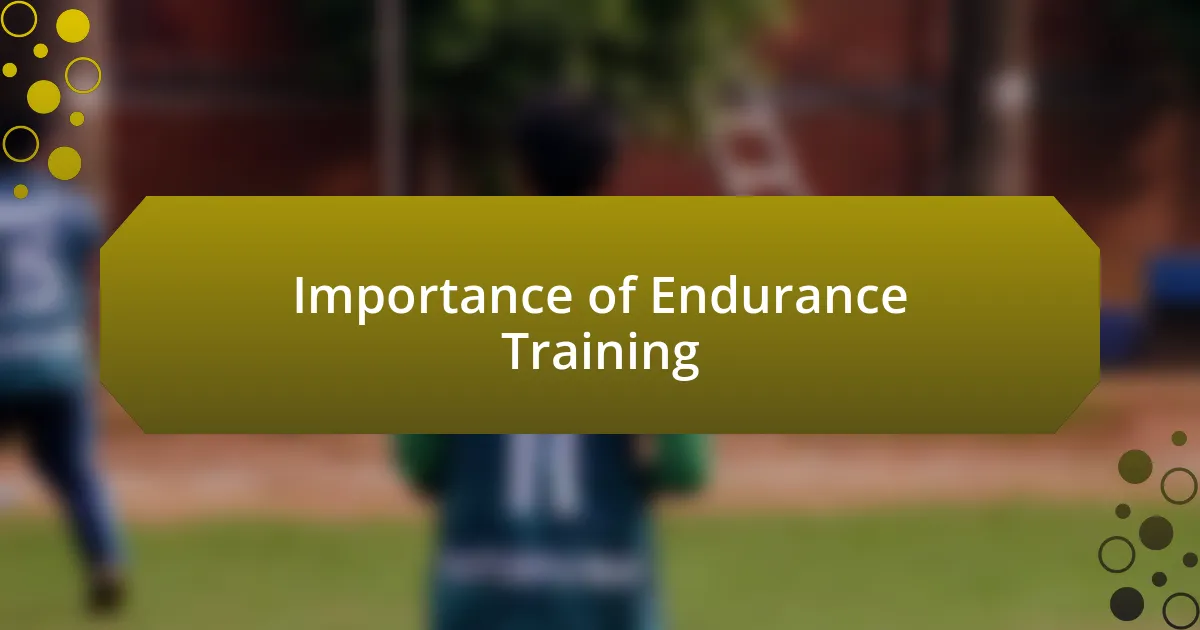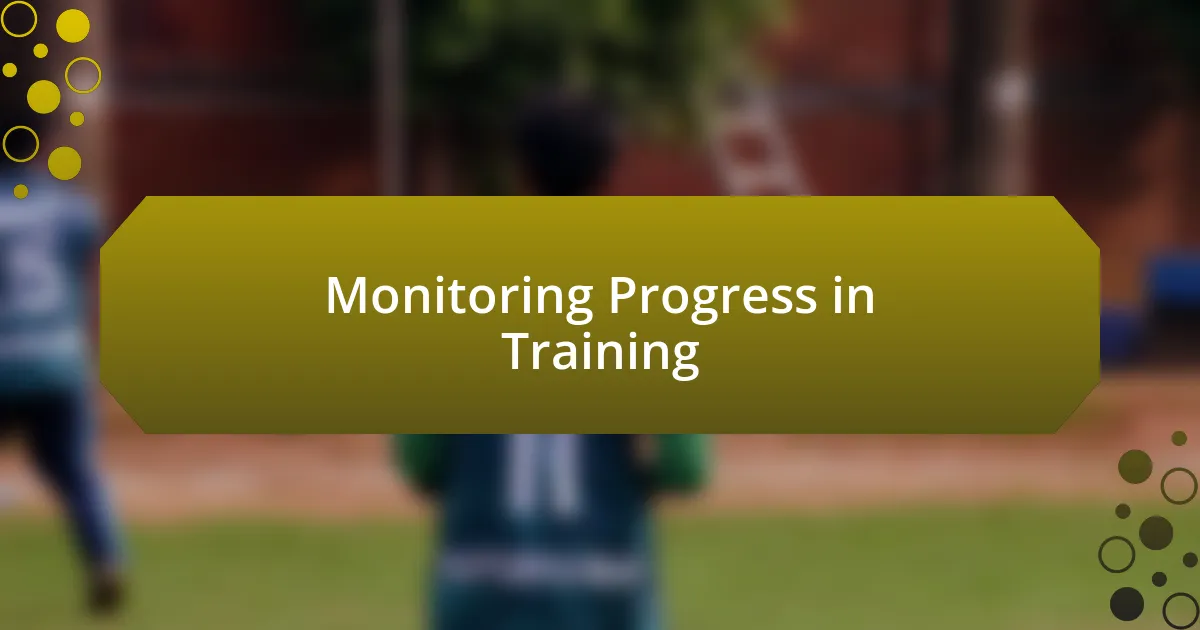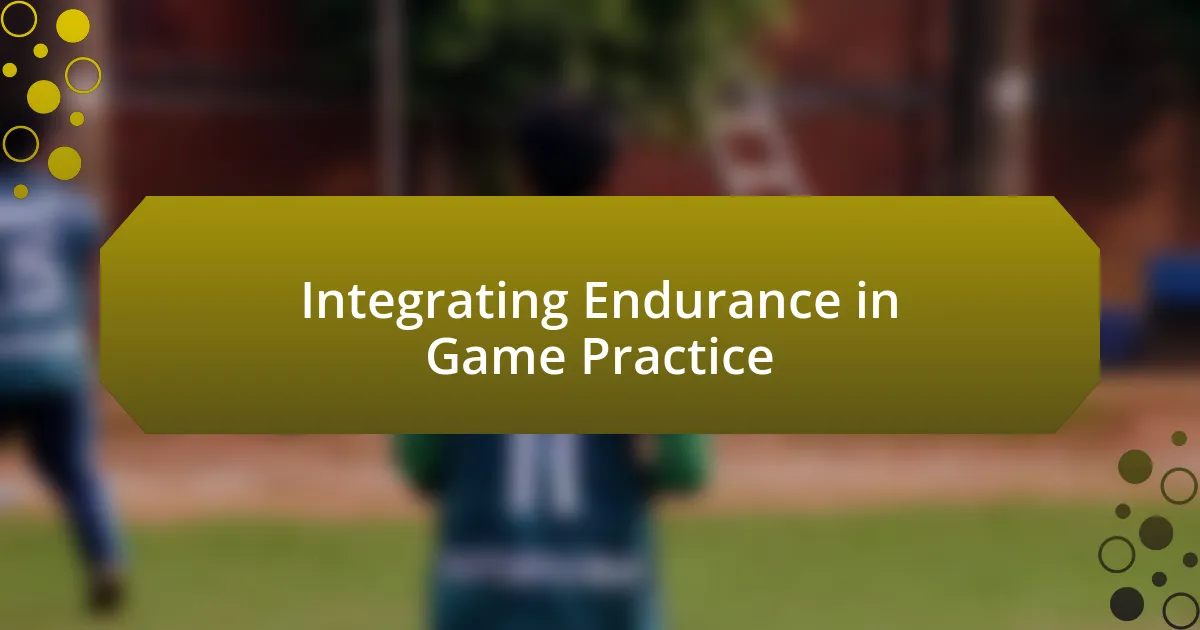Key takeaways:
- Endurance in fielding is a blend of physical stamina and mental resilience, crucial for maintaining focus during games.
- Endurance training not only enhances individual performance but also strengthens team dynamics and self-confidence.
- Key exercises for building endurance include interval training, agility drills, hill sprints, and circuit training.
- Nutritional habits and hydration significantly affect endurance and overall performance on the field.

Understanding Endurance for Fielding
Endurance in fielding goes beyond just physical stamina; it’s a mental game as well. I can vividly remember a time during a crucial match when fatigue set in, and I felt the weight of my team’s expectations. In that moment, I asked myself, “What would I give to ensure our victory?” Understanding that my endurance was key to maintaining focus and agility on the field made all the difference.
As I delved into developing my endurance, I realized that it wasn’t just about running drills or hitting the gym. It involved honing my ability to recover between plays and to stay mentally sharp, regardless of how my body felt. Have you ever noticed how even a single moment of distraction can lead to a missed catch? That’s the kind of mental resilience I learned to cultivate, balancing physical training with mindfulness and visualization techniques.
Training for endurance in fielding has taught me that every practice session is an opportunity to push my limits. One day, I decided to challenge myself by simulating game-like pressure during drills, intentionally increasing the intensity to mirror the fatigue I’d experience during a match. The sense of accomplishment after those sessions wasn’t just about physical strength; it was about building a deeper understanding of what true endurance means for fielding performance.

Importance of Endurance Training
When I first started my endurance training, I underestimated its importance. During my early practices, I often found myself gasping for breath and losing focus before the game even began. I remember feeling frustrated because I knew that my skills were being overshadowed by my lack of stamina. It became clear that endurance training is crucial not just for physical longevity in the game, but also for maintaining the mental sharpness needed to execute skills effectively.
Moreover, I’ve come to appreciate how endurance impacts team dynamics on the field. I recall one particular match where my endurance was put to the test. As the game wore on, my teammates began to tire, but I felt strong enough to cover for them. In that moment, I understood how important it is to be the reliable player who can step up—both for myself and the entire team. Endurance training has a ripple effect, enhancing not only individual performance but also fostering team trust and cohesion.
Lastly, I found that endurance training has a significant impact on my self-confidence. There’s something incredibly empowering about knowing that I can outlast my opponents and keep pushing forward when fatigue sets in. The training sessions, though tough, have transformed my mindset. Each drop of sweat reminded me that I was preparing to face challenges head-on, both physically and mentally. This internal transformation is just as crucial as the physical aspects, making endurance training an essential part of my fielding journey.
| Aspect | Importance of Endurance Training |
|---|---|
| Physical Stamina | Allows for sustained performance throughout the game |
| Mental Resilience | Helps maintain focus under pressure |
| Team Dynamics | Enables players to support each other effectively |
| Self-Confidence | Increases belief in one’s abilities to overcome challenges |

Key Exercises for Endurance
To develop my endurance for fielding, I focused on specific exercises that consistently pushed my limits. I vividly remember my first long-distance runs; the initial discomfort was daunting. However, those moments of struggle gradually transformed into a sense of accomplishment as I built my stamina. My goal was always clear: to keep running, no matter how fatigued I felt.
Here are some key exercises that have significantly contributed to my endurance:
- Interval Training: Short bursts of intense running followed by recovery periods helped me improve my aerobic capacity.
- Agility Drills: Incorporating drills like shuttle runs built explosive power while demanding a higher level of cardiovascular fitness.
- Hill Sprints: Challenging myself with uphill sprints not only increased my leg strength but also boosted my endurance exponentially.
- Circuit Training: Enthusiastically combining bodyweight exercises and cardio kept my heart rate elevated, simulating the demands of a fielding game.
These exercises became fundamental to my routine, and witnessing the results of my hard work truly motivated me to continue pushing forward. There’s something incredibly invigorating about realizing that the effort invested in training translates directly into improved performance on the field.

Nutrition for Enhancing Endurance
Nutrition plays a pivotal role in boosting endurance, something I learned firsthand during my training. I vividly recall those days when I focused on meal prepping to ensure I fueled my body correctly. Eating complex carbohydrates like quinoa and sweet potatoes gave me the sustained energy I needed throughout my runs, allowing me to push past boundaries I once thought unreachable.
Hydration is another key element that I often overlooked in the beginning. I remember one particularly challenging practice where I underestimated my water intake, feeling fatigued much earlier than usual. It taught me that staying well-hydrated not only helps prevent fatigue but also keeps my concentration sharp during critical moments in the game.
Incorporating a mix of proteins and healthy fats into my diet proved essential as well. I started including snacks like almonds and Greek yogurt, which provided the necessary recovery after intense workouts. Have you ever felt that post-workout hunger? That’s your body signaling it needs nourishment to repair and grow stronger. Listening to that signal transformed my approach to nutrition, ensuring I was always ready for the next challenge on the field.

Monitoring Progress in Training
Keeping track of my training progress was a game changer for me. I started using a simple notebook where I logged my daily workouts, noting down how I felt before and after each session. Looking back at these entries not only helped me see how much I had improved but also highlighted areas that needed extra attention. Have you ever noticed how reflecting on past efforts can motivate you to push further?
I also embraced technology by using fitness apps and wearable devices. These tools provided real-time data on my heart rate and distance covered, which offered insights I couldn’t have gained otherwise. One day while reviewing my pace, I realized how a slight adjustment in my training schedule led to a significant increase in my stamina. Wasn’t that a pleasant surprise?
In addition to self-monitoring, I sought feedback from my coach. Their perspective often shed light on my progress and helped refine my goals. I vividly remember a conversation where they pointed out my technique improvements that I hadn’t noticed. Such discussions kept me accountable and fueled my enthusiasm for future training sessions, ultimately enhancing my endurance on the field.

Mental Strategies for Fielding
Mental fortitude is crucial for fielding, as it directly impacts performance during high-pressure situations. I found that visualizing successful plays significantly boosted my confidence and reduced anxiety. Picture this: before a big game, I’d close my eyes and imagine myself making flawless catches and accurate throws. This mental rehearsal not only prepared me but also made me feel more at ease when it was time to perform on the field. Have you ever tried visualizing your success?
I also learned the power of focus. During practices, I made a conscious effort to eliminate distractions, whether that was my teammates’ chatter or my own wandering thoughts. By centering my attention on the ball and the game’s rhythm, I was able to react quicker and more instinctively. One moment stands out; during one practice, I decided to focus solely on my breathing. This simple shift allowed me to maintain calmness, especially in moments where others might have panicked.
Additionally, I embraced a positive self-talk approach. Instead of dwelling on mistakes, I would remind myself that every error was a learning opportunity. I vividly recall a game where I misjudged a catch, and instead of berating myself, I gave a mental high five for my willingness to learn and improve. This positivity not only lightened my mood but also reinforced my resilience. How do you handle setbacks in your own training?

Integrating Endurance in Game Practice
Integrating endurance into game practice is essential, and I’ve always found that incorporating elements of interval training can be highly effective. For instance, during one practice, we set up a series of drills that required sprinting between bases followed by quick fielding tasks. This not only kept my heart rate up but also mimicked the stop-and-go nature of an actual game. Have you ever noticed how exhaustion can lead to mistakes in the field? I certainly have.
Another technique I employed was practicing longer sessions without breaks. I remember one particular day when we pushed through a two-hour practice that mirrored the true duration of a game. By the end, my legs were heavy, but I felt an incredible sense of accomplishment. It was a great reminder that the ability to endure through fatigue can set you apart in crucial moments. Isn’t it empowering to know your training can give you an edge when the game is on the line?
Moreover, I learned to incorporate endurance drills into scrimmages. By setting conditions, such as limiting substitutions or increasing the pace, I forced myself and my teammates to maintain high energy levels. One memorable scrimmage was intense, with everyone pushing to make each play. While I felt spent at the end, the realization hit me—I was building a mental resilience alongside my physical endurance. Wouldn’t you agree that facing fatigue in practice boosts our confidence when it matters most?













